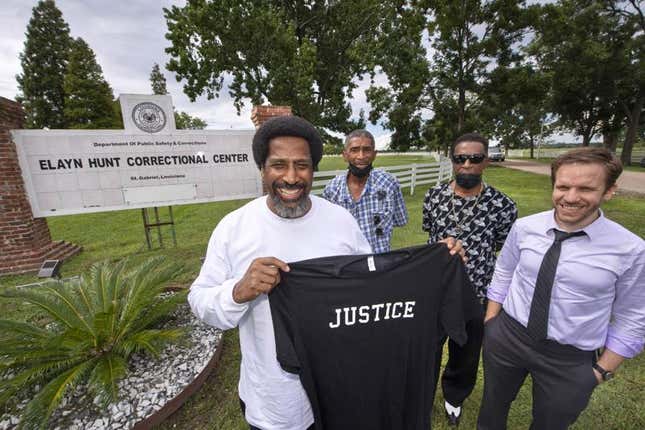
Sullivan Walter, 53, has been exonerated from a 36-year-old conviction in a home-invasion rape he did not commit in 1986, according to The Associated Press. Judge Darryl Derbigny was angered, finding that the evidence that could’ve cleared Walter’s name never made it to the jury. Walter spent his whole life in prison for no reason.
For many of the recent Black exoneration cases, the reason for the wrongful convictions were the same: hidden evidence, a botched investigation or crappy attorneys. In Walter’s case, there were a couple of “red flags” leading to his conviction at just 17 years old. First off, attorney Emily Maw said Walter was mistakenly identified in a lineup six weeks after the incident. Per court documents, the victim couldn’t see the culprit as he was masked in an unlit room.
Secondly, Walter’s previous counsel failed to point out conflicting statements from investigators and missteps during his appeal process. The cherry on top was finding that the blood and semen collected from the victim did not match that of Walter. This evidence wasn’t provided to the jury.
“To say this was unconscionable is an understatement,” Derbigny told Walter, via AP News.
Read more on the case from AP News:
District Attorney Jason Williams’ office joined with defense attorneys working with Innocence Project New Orleans, a criminal justice advocacy group, to have the conviction vacated.
Attorneys said the victim in the rape is now deceased. Maw said in court that authorities had reached out to the victim’s son, who was not present, and that he had expressed regret on behalf of his mother about the wrongful conviction.
Innocence Project New Orleans Legal Director Richard Davis said Walter’s race was a factor in the wrongful conviction.
“The lawyers and law enforcement involved acted as if they believed that they could do what they chose to a Black teenager from a poor family and would never be scrutinized or held to account,” Davis said in a written statement. “This is not just about individuals and their choices, but the systems that let them happen.”
The Georgia Innocence Project reported that 1 in 20 criminal cases are a wrongful conviction, meaning 4-6 percent of people in prison right now are innocent. On top of that, Black people make up 60 percent of DNA exonerations in the country and 56 percent of those involved mistaken eyewitness identifications.
Why is it that after they’ve served majority of their sentence they are finally freed?
These statistics alone illustrate how Black people are abused by the criminal justice system, left to rot in prison while the real culprits walk free. How is that justice? A young, teenaged Walter had no idea the corruption he was up against.
“I believed in my mind, at that time, that it was impossible for a man to be falsely accused and charged with something that they didn’t do. I didn’t quite understand…why me?” he said to WWLTV. “My breath was taken away for 36 years of my life and the moment I was released, when I walked out the gates, I really felt that I was able to breathe once again.”